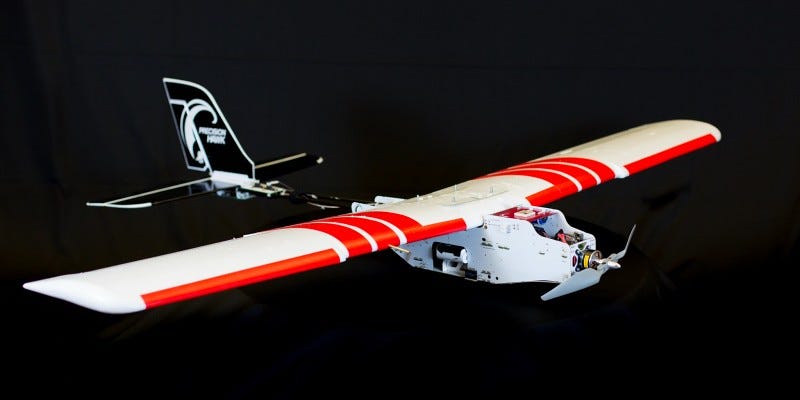Indiana State, PrecisionHawk Aim High With Partnership
 Precision Hawk's UAVs are equipped with a wide array of sensors.
Precision Hawk's UAVs are equipped with a wide array of sensors.
Subscriber Benefit
As a subscriber you can listen to articles at work, in the car, or while you work out. Subscribe NowIndiana State University’s drone program is launching its first formal partnership with the private industry to open more doors for students and spur research in the burgeoning market. North Carolina-based PrecisionHawk, which has operations in Noblesville, has signed an agreement with ISU for unmanned aerial systems research and development—a collaboration that’s expected to take both to new heights.
ISU and PrecisionHawk are already well acquainted; the two have been working together for several years informally, and PrecisionHawk employs several ISU alumni.
“[Our relationship] has grown and strengthened over time,” says ISU’s Center for Unmanned Systems Executive Director Dr. Richard Baker. “It wasn’t by design, it was finding out that their niche in private industry and our niche with education and training fit together well, and we just grew from there.”
Baker says ISU will benefit from PrecisionHawk’s footing in private industry; more than just a drone company, PrecisionHawk’s expertise includes aerial data collection and subsequent data management and analysis.
“We get a huge benefit in the research area by working with someone who has multiple industry sectors they work in. PrecisionHawk is involved in precision agriculture, emergency response and management, and they’re looking at applications for open-air mining and many other areas too,” says Baker. “As they go forward in these areas and research different industries, we’ll be working with them and finding new ways to apply UAVs (unmanned aerial vehicles) in those industries.”
One focus of the partnership is airspace deconfliction—in basic terms, making sure UAVs don’t run into each other or other objects as airspace becomes more crowded due to the growing number of commercial and recreational drone operators. PrecisionHawk’s Low Altitude Traffic and Airspace Service (LATAS) program is focused in this area and will be further developed through the partnership.
A second focus is training and education for both commercial and recreational drone operators. In an industry that is advancing at a breathtaking pace, Baker says ISU will lead the development of programs that teach people how to use drones, operate them safely and adhere to regulations.
Both expect the partnership will also create momentum in data analytics. Because commercial UAVs are equipped with a wide array of sensors that can collect a mind-boggling amount of data, the information must be translated into what PrecisionHawk calls “actionable insights.”
“If you fly over a farmer’s field, for example, you can collect data with the sensors on the aircraft about the crops or the ground,” says Baker. “You can tell if the crops are healthy or not, if they’re being attacked by pests, or have enough certain nutrients or moisture levels. We’ll help put together the algorithms in the data analytic area to help farmers understand what it is they’re seeing.”
Baker expects the partnership will only swell the “student pipeline” for PrecisionHawk, which already employs several ISU graduates. Additionally, he says the university brings its “collective assets” to the partnership, including access to all five colleges, as well the other public partners and universities working with ISU’s UAV program.
“We bring strengths from the education side, research and our collaborations with other people in the industry. PrecisionHawk brings its strengths in manufacturing hardware and software engineering. It also provides a full lifecycle from data collection to actionable information through analytics,” says Baker. “Together, we look at the entire spectrum of how these unmanned vehicles are being used, what they’re being used for and how to deliver information to people—and that’s the whole purpose.”
Baker says the partnership will give students real-world UAV experience.
Baker says ISU is a logical partner for PrecisionHawk.
